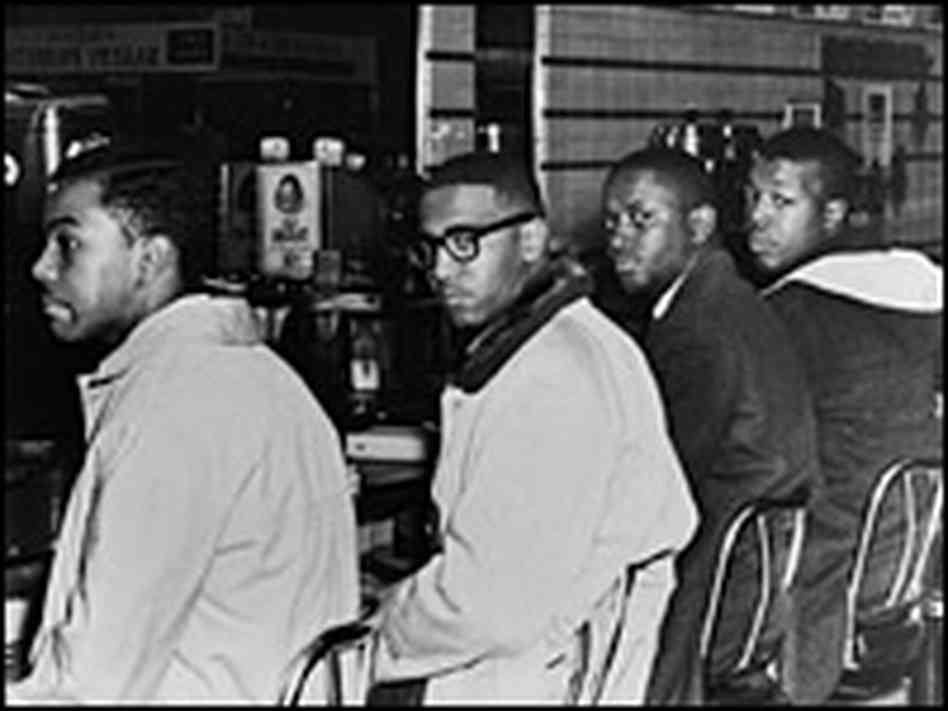 I volunteered today. Whenever I do volunteer, I walk away feeling that I took away much more from the experience than I gave, and today was no different. One of the biggest lessons of the day was a statement that calmly came out of the mouth of Mr. Franklin McCain. I had the great pleasure of sliding into a seat next to him today at the International Civil Rights Center and Museum. I chose this seat because I wanted to thank him.
I volunteered today. Whenever I do volunteer, I walk away feeling that I took away much more from the experience than I gave, and today was no different. One of the biggest lessons of the day was a statement that calmly came out of the mouth of Mr. Franklin McCain. I had the great pleasure of sliding into a seat next to him today at the International Civil Rights Center and Museum. I chose this seat because I wanted to thank him.
You may be wondering why I wanted to thank him. Let’s back up a minute. It is time for a quick history lesson:
In 1960, the city of Greensboro, North Carolina (USA) was largely segregated. This meant that a young African American college student like Franklin McCain (wearing glasses in the photo to your left) could work at the counter at the local Woolworth’s store and purchase items in the store, but he couldn’t sit at the lunch counter to eat. The “Greensboro Four” were four local university students who decided that they were sick and tired of segregation, so they planned a “sit in” at the lunch counter. After shopping in the store, they walked to the lunch counter and sat down to eat. They were refused service. They showed their receipts and questioned why their money was good enough in other parts of the store, but not at the lunch counter. They were largely ignored in the hopes that they would go away. They didn’t. Within five days, approximately 300 protesters joined them. Their actions were the catalyst to the “sit in” movement in the US.

They were college students, very much like those we serve at colleges around the world today.
When I sat down next to Mr. McCain and introduced myself and thanked him for his work, he was incredibly humble. I asked him what emotions arose when he walked into the same Woolworth shop space all of these years later. He said he has a mix of emotions – memories of those days, yet not focusing on the past but rather the work that needs to be done today. He spoke about how we are all put on this planet to help those who are in need and that we are not here to focus exclusively on making money. (Amen!) His faith is a largely behind these beliefs.
But I had to ask him about fear. Wasn’t he afraid of doing something that could have had a potentially dangerous outcome for him and his friends?
His answer:
I had no time for fear.
Followed by…are you ready:
I was ready for my human dignity and my manhood.
BAM! Those words hit me in my gut without him lifting even a finger.

Why do we often feel the need to ask permission for what is right and just? Why do we think that rules and politics and bureaucracy and power come before human dignity? Why do we question our ability to use our voices and actions to articulate “enough IS enough”?
I ask this question in 2013, not 1960. I ask this as a woman who is still not taken as seriously as men in many circles, as a person who has worked tirelessly for what is right and just, yet still has to fight. Hard.
Mr. McCain, with his soft eyes floating behind large green glasses akin to the large frames he work in 1960 stated the obvious. Fear has no place in this world because dignity is meant for ALL of us.
Tears welled up in my eyes at his words and one fell down my left cheek. Right there, in front of Mr. McCain, I wept softly. His bravery as a young college student in a horrific period in our country’s history reminded me never to underestimate our students. They are fearless and we should encourage them to be. It is those fearless young people who are the agents of social change. It is those young college students who become elders who carry their wisdom like a backpack bursting with life experiences.
Mr. McCain eventually told me what he does fear: Not being around to teach his grandchildren. This wisdom that he carries comes from many years on this earth and he has too many stories to share with them and other young people. Talking with them brings him hope for this world.
I couldn’t agree more.

Needless to say, my day volunteering at the museum was one that I will not forget.
Reverend Jesse Jackson, a legend in the civil rights history books, was also a lively presence in Greensboro today. Did you know he completed his BA degree at North Carolina A&T State University in Greensboro, also where the Greensboro Four studied?
Visit the International Civil Rights Center and Museum to learn more about the events of 1960 in Greensboro and much more. If you would like to book Mr. McCain to speak at your college, you can reach him through the center too. I’m sure it would be a presentation that you’d remember for a very long time!


Pls note that Mr. McCain passed away suddenly in January 2014. 🙁 It was a true honor to speak with him and I’m saddened that his story cannot be personally shared. My sincere and deepest sympathy to his family who he spoke of – especially his grandchildren – as he told me that they were the reason he lives. What a hero and what a grandfather!